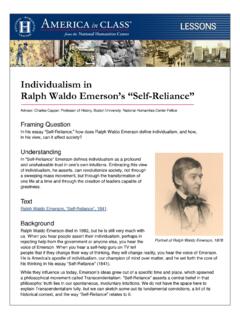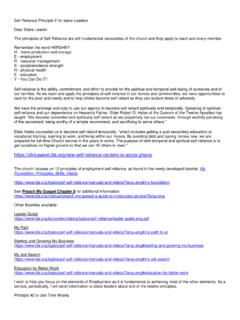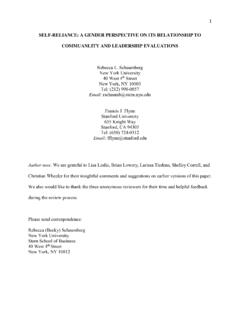Transcription of Self-Reliance Ralph Waldo Emerson
1 From Self-Reliance 393 Literary AnalysisTr anscendentalismWhatdoes the passage beginning Trust thyself tell you about Emerson s belief in the importance ofthe individual?Vo cabulary Builderchaos (k s ) of matter and space, supposedto have existedbefore the ordered universeWhat does Emerson believe about being trueto oneself?There is a time in every man s education when he arrives at the conviction that envy is ignorance; that imitation is suicide; that he must take himself for better, for worse, as his portion; that though the wide universe is full of good, no kernel of nourishing corn can come to him but through his toil bestowed on that plot of ground which is given to him to till. The power which resides in him is new in nature, and none but he knows what that is which he can do, nor does he know until he has tried.
2 Not for nothing one face, one character, one fact makes much impression on him, and another none. This sculpture in the memory is not without preestablished harmony. The eye was placed where one ray should fall, that it might testify of that particular ray. We but half express ourselves, and are ashamed of that divine idea which each of us represents. It may be safely trusted as proportionate and of good issues, so it be faithfully imparted, but God will not have his work made manifest by cowards. A man is relieved and gay when he has put his heart into his work and done his best; but what he has said or done otherwise, shall give him no peace. It is a deliverance which does not deliver. In the attempt his genius deserts him; no muse befriends; no invention, no ust thyself: every heart vibrates to that iron string.
3 Accept the place the divine providence has found for you; the society of your con-temporaries, the connection of events. Great men have always done so and confided themselves childlike to the genius of their age, betraying their perception that the absolutely trustworthy was stirring at their heart, working through their hands, predominating in all their being. And we are now men, and must accept in the highest mind the same transcendent destiny; and not minors and invalids in a protected cor-ner, but guides, redeemers, and benefactors. Obeying the Almighty effort and advancing on chaosand the Dark..Society everywhere is in conspiracy against the manhood of every one of its members. Society is a joint-stock company in which the members agree for the better securing of his bread to each shareholder, 393 About the SelectionsIn his essay, Self-Reliance , whichechoes a theme common to many ofhis works, Emerson exhorts readersto avoid blindly conforming to theideas and behavior dictated by soci-ety or peers.
4 Instead, he urges peopleto think and act the poems Concord Hymn and The Snowstorm, Emersoncontinues his celebration of countryand nature. In Concord Hymn, Emerson praises the bravery of theminutemen who fought at Lexingtonand Concord. The poem conveys themessage that people who make greatsacrifices for noble causes such asfreedom will never be forgotten. In The Snowstorm, Emerson developsan extended metaphor in which hecompares nature s force during asnowstorm to an architect crafting abuilding. The poem conveys themessage that nature is capable ofcreating works of amazing beautythat parallel or surpass those pro-duced by human AnalysisTranscendentalism Read aloud the bracketed text to students, and then reread theopening two words: Trust thyself. Urge students to find evidence inthe paragraph for this openingexhortation.
5 T o help students, go around theclassroom and have volunteersexpress the meaning of eachsentence in their own words. Askstudents the Literary Analysisquestion: What does the passagebeginning Trust thyself tell youabout Emerson s belief in theimportance of the individual?Possible response:He believesthe individual s importance is fromGod and that people must there-fore honor it and trust in CheckAnswer: Emerson believes it produces the best work and the mostspiritual peace. He believes thatunless one is true to oneself, one willnever find for Special Needs StudentsHave students read the essayin small groups, pausing at theend of each paragraph toidentify the sentence that bestsums up its meaning. Studentsshould then try to restate themeaning of each topic sen-tence in their own to check on theprogress of the groups andclarify any for Less Proficient ReadersEncourage students to lookclosely at the first sentence ofeach paragraph.
6 These sen-tences essentially serve as anoutline of the key points in theessay. By grasping the ideas inthese sentences, students willbe well on their way to identi-fying Emerson s main students draft a list ofthe main forGifted/Talented StudentsAsk students to review whatthey have learned aboutEmerson s life and , challenge them to givea brief talk to the class inwhich they relate informationabout Emerson s personalexperiences to the ideas hediscusses in Waldo Emerson394 A Growing Nation (1800 1870)1. Pythagoras .. Newtonindividuals who made major contributions to scientific, philosophical, or religious Builderaversion ( v r zh n)n. object arousing an intense dislikesuffrage (suf rij) or votingdivines (d v nz ) : More about Ralph Waldo EmersonVisit: Code: ere-9311to surrender the liberty and culture of the eater.
7 The virtue in most request is conformity. Self-Reliance is its aversion. It loves not realities and creators, but names and would be a man must be a nonconformist. He who would gather immortal palms must not be hindered by the name of goodness, but must explore if it be goodness. Nothing is at last sacred but the integrity of your own mind. Absolve you to yourself, and you shall have the suffrage of the world..A foolish consistency is the hobgoblin of little minds, adored by lit-tle statesmen and philosophers and divines. With consistency a great soul has simply nothing to do. He may as well concern himself with his shadow on the wall. Speak what you think now in hard words and tomorrow speak what tomorrow thinks in hard words again, though it contradict everything you said today.
8 Ah, so you shall be sure to be misunderstood? is it so bad, then, to be misunderstood? Pythagoras was misunderstood, and Socrates, and Jesus, and Luther, and Copernicus, and Galileo, and Newton,1 and every pure and wise spirit that ever took flesh. To be great is to be misunderstood..Critical Reading1. Respond: Which aspects, if any, of today s American culture reflect Emerson s belief in Self-Reliance ?2. (a) Recall: What terms does Emerson use to describe society?(b) Interpret: According to Emerson , what is society s main purpose?(c) Draw Conclusions: In what ways does Emerson believe people should be affected by the way others perceive them?3. (a) Recall: According to Emerson , what do Pythagoras, Socrates, Jesus, Luther, Copernicus, Galileo, and Newton have in common?(b) Support: What evidence does Emerson use to support his claim that to be great is to be misunderstood ?
9 4. (a) Make a Judgment: How important is Emerson s use of the adjective foolish in his discussion of consistency? (b) Speculate: Do you think there would be any circumstances in which Emerson would advocate the benefits of consistency? (a) Interpret: According to Emerson , what role does the divine have in determining each person s circumstances? (b) Generalize: What would Emerson say is each person s reason for living? Apply: Which of Emerson s statements, if any, would you choose as a guideline for personal conduct? Revolutionary BattlesIn April 1775, a British military force marchedto confiscate colonial arms they knew werestockpiled in Concord, Massachusetts. Alongthe way, they were confronted at dawn onApril 19 by a small group of militia on theLexington green. The British dispersed theAmericans, killing ten, and then moved on toConcord, five miles away.
10 There, they were metby a larger contingent of militia, who attackedthem at the North Bridge. At this spot, the firstBritish blood of the Revolution was spilled. TheBritish retreated to Boston. On the way, theywere repeatedly attacked by thousands ofAmerican militia. Many years later, sculptorDaniel Chester French created his commemora-tive statue with the support of a Concord resi-dent who wished to memorialize the spotwhere Americans Students may cite our society stendency to admire self -made (a) He describes it as a joint-stockcompany. (b) Its purpose is toconspire against individual Self-Reliance . (c) People should notcare how others perceive (a) They were all misunderstood.(b) He points out that some of thegreatest people who ever livedwere (a) It is important because itdistinguishes between a rationalconsistency of thought andpurpose and an unreasoning,compulsory conformity.










